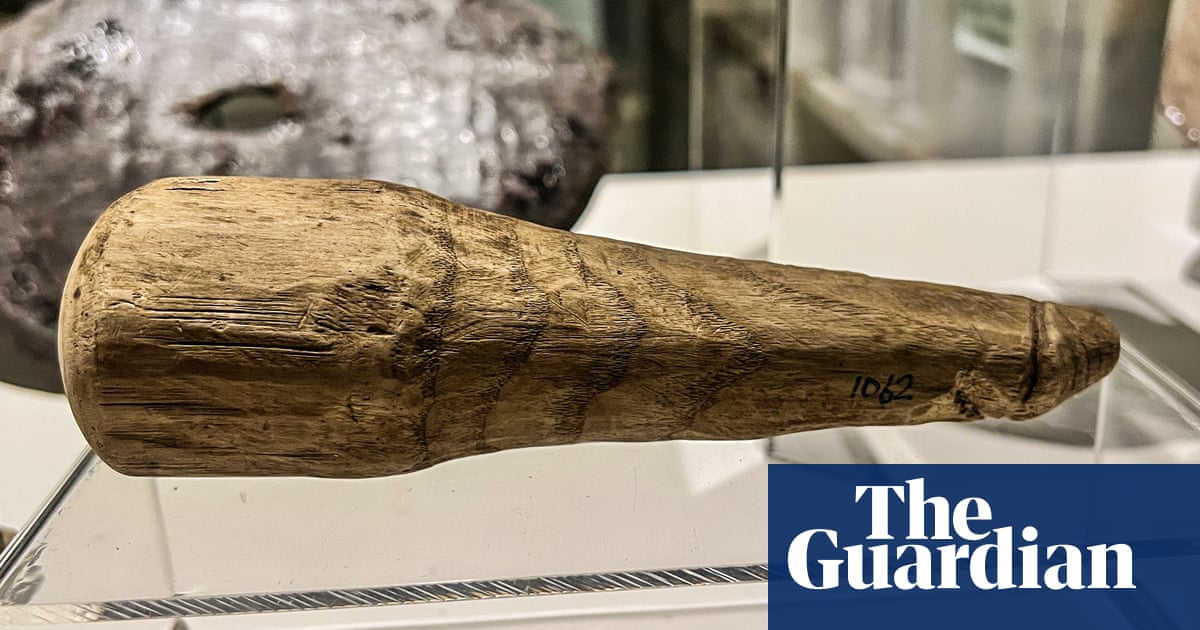
ussell T Davies’s drama It’s a Sin, charting the early years of the Aids epidemic in the UK, arrives on our screens with a pep in its step that may at first seem at odds with the subject. It is difficult, after all, to think cheerfully about an epidemic that has taken thousands of lives in Britain alone, and a virus that an estimated 100,000 people in the country still live with. Its title is particularly apt: the 1987 Pet Shop Boys track it’s borrowed from summons both the decadent pleasures of the era and that all-pervading sense of shame: the shame of the illness itself, so vicious and mysterious at first, and the fact that it often came from gay sex, perceived for so long as shameful, too.
And yet – it is a Russell T Davies show. This is the man who gave us Queer As Folk, Cucumber and an enjoyably queered Doctor Who. As we follow a ragtag bunch of young friends in London in the early 80s, spearheaded by the effervescent Ritchie (played by Years & Years singer Olly Alexander), there are shags, gags and parties galore, plus the undeniable camp of Tracy-Ann Oberman as Ritchie’s agent and a glorious Keeley Hawes as his mum. Ritchie’s clan includes sweet Welsh lad Colin (Callum Scott Howells), the fiercely defiant Roscoe (Omari Douglas), the more sensitive Ash (Nathaniel Curtis) and Lydia West’s Jill, unofficial mum to the group. We see them negotiate the usual stuff young adults have to face – sex, studies, jobs and litres of booze – against the slowly darkening backdrop of the HIV/Aids crisis. Some live, some die, but all resolve to have a hoot. If It’s a Sin is about the horror of so many lights being snuffed out, it is still utterly flaming.
It is that mixture of innocent joy and growing dread that is the show’s calling card, according to the cast, first interviewed early last year. “It’s not mainly about death,” promises Scott Howells, sitting alongside Alexander and West in a former school on the outskirts of Manchester, which has been turned, for the production, into the friends’ den-cum-flat “The Pink Palace”, all 80s pop star posters and uncompromising wallpaper. “It’s about life: their vibrant, colourful, beautiful lives.”
Davies did lose plenty of friends to the disease, and it is clear he is partly writing the show for them. But grief of another sort hovers over the show: he lost his husband Andrew Smith to cancer in 2018 after a long illness. “It’s there enormously,” he says. “There’s no way you can sit there writing all day without that coming out. I think if I was sitting here writing Fireman Sam, something sad would have happened to his cat.” One of the deaths in the show echoes Andrew’s almost stage by stage, but that is also, he says, just the writer in him scavenging for material. “You can’t help but use it.”
If It’s a Sin is a period piece, its very creation now looks like another type of period piece, considering that filming was done before the pandemic hit. When I visited the set in January 2020, there was only one virus on our minds. Talking with Davies and Alexander months later, they shrink from glib comparisons.
“I definitely had many complicated feelings,” says Alexander. “All the sensational headlines, all the rumours about where coronavirus came from and who was to blame … The response in the 80s, when this disease first appeared, was just so lacking – and there are loads of reasons for that. But it took decades to get on top of it.”
Both agree that things have radically improved in terms of HIV acceptance; Alexander has educated himself hugely over the last decade, after shirking the topic, as many do, in his teens. But they emphasise that there is still an awful long way to go.
“We can get as embarrassed about sex now as we did then,” says Davies. “If coronavirus was a sexually transmitted disease, it would be much more hidden, still.”
Is It’s a Sin political? It does intersect with Westminster when Roscoe embarks on an affair with a Tory MP (Stephen Fry), and Margaret Thatcher makes a tiny cameo (“She gets her comeuppance!” cries Davies, delightedly). Yet he didn’t want to make a “corridors of power” drama; he doesn’t believe in simply vilifying Thatcher’s government for its broadly inadequate response. It’s a nuanced situation this domestic drama couldn’t make room for.
“It was a big decision I made early on,” he says. You could, he points out, write a drama where you are with the then-health secretary Norman Fowler as he discusses the 1986 “Monolith” TV advert, a stark public announcement that advised viewers: “Don’t die of ignorance.” You could also, he says, show Princess Diana holding an Aids patient’s hand at a time when fears about contagion were rife. “That’s a gorgeous moment and more pivotal, more epic, than we can even realise today,” he says. “But the whole thing would have started to look like Zelig, if our characters had been at all these key moments in history.”
One area where the show is defiantly political, though, is in its casting. It’s a Sin is not only racially diverse, but it also satisfies the current demand for gay actors to be cast in gay roles. Davies is still marked by someone coming up to him on a dancefloor in Manchester after 1999’s Queer As Folk came out, and asking why he didn’t cast gay people in the leads. “I said: ‘I didn’t know you existed, I’m sorry,’ and he said back: ‘Did you look?’” So now, Davies says, he looks. He estimates that It’s a Sin cast 40 to 50 gay actors, even in straight roles, something else he is unapologetic about (“You’re just correcting an imbalance that goes back thousands of years”). That said, he admits this is a very 2020 stance. “It was different five years ago – and I might change my mind in five years.”
Speaking of 2020, did Davies have to watch his mouth for a more woke audience? “I know what you mean,” he says. One of the chief characteristics of queer culture is saying the unsayable – vicious transgression soused in irony. But this can date, or just seem cruel. “You could have written a bunch of gay boys in the 80s sitting round a table taking the piss out of lesbians,” says Davies. “But in the 80s we were thicker about everything.” Being wildly un-PC would have “overwhelmed the drama”, he thinks. “It’s all we’d sit and talk about now.”
Still, no one could mistake It’s a Sin for a sanitised version of the culture it portrays. It doesn’t shy away from the less palatable sides of the story; for one thing, one character admits they have very probably infected others with HIV, shagging away in denial. This was something very important, and rare, to feature, says Davies. “Those people who had HIV and who continued to sleep with people are always portrayed as villains – and they weren’t. They were just boys. Just horny, stupid boys who couldn’t believe what was happening to them.”
I also congratulate him on a scene in the first episode where Ritchie, still a virgin, is schooled on the importance of hygiene before sex. Davies honks with laughter, but gets serious again. He never puts those things in “just for a laugh”, he promises. “That’s a really important scene,” he says, “the one where Ritchie washes his arse. Because it says: this is where we are; this drama is on the level of body fluids and fucking and good behaviour in bed – because, actually, this is where the virus happens.”
Fair play, I say: your next honorary Bafta is sorted. Another honk. “A gold-plated douche!”












